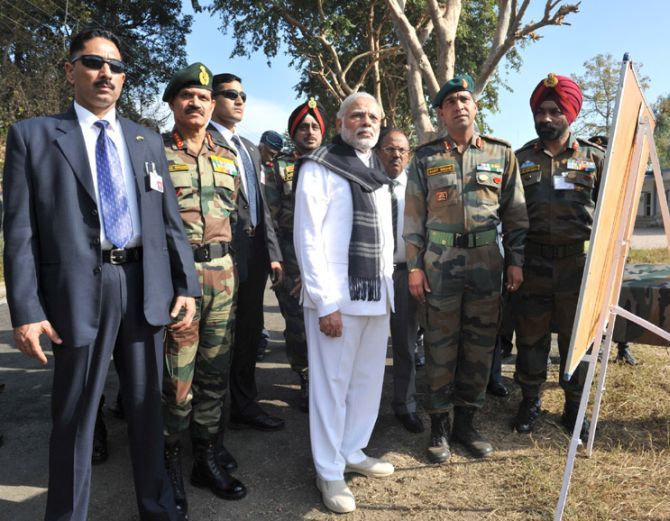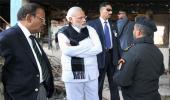Denying the Pakistani investigators access to the Pathankot base on operational grounds would not, the government felt, compromise national security, reveals Rajeev Sharma.

If the daring terror attack on India's largest military base in Pathankot in early January marked a serious provocation between India and Pakistan as it came barely a week after Prime Minister Narendra Modi's unexpected visit to Lahore, the two sides are now poised to convert this challenge into an opportunity.
History will be scripted when a Pakistan Joint Investigation Team arrives in India on Sunday, March 27, to investigate the Pathankot terror attack, which, according to India, was choreographed by the Pakistan-based terror outfit Jaish-e-Mohammed's leadership.
India has shared evidence and conveyed to Pakistan that Jaish chief Masood Azhar was the main conspirator and perpetrator behind the attack.
A joint investigation by India and Pakistan in a terror attack is unprecedented. The Pakistani side took a positive step on March 18 when it lodged a First Information Report in the Pathankot case, though against 'unknown persons.' The Pakistani establishment also confirmed that Masood Azhar is in protective custody.
The Pakistani JIT will begin its work on Monday, March 28. It will be taken to the Pathankot base on Tuesday, March 29. It will be accompanied by a National Investigation Agency team.
The NIA will primarily be responsible for taking the Pakistani JIT around the terror attack sites and answering questions that the Pakistanis have.
The NIA will also make available to the JIT several eyewitnesses of the attack that lasted four days. These witnesses will be largely from the defence establishment. The JIT's tour of the Pathankot base is expected to be a day-long affair after which it will return home.
The five-member Pakistani JIT comprises senior officers from the military intelligence and civil administration and is headed by the chief of Pakistani Punjab's counter terrorism department Additional Inspector General of Police Muhammad Tahir Rai.
Other members are Lahore Deputy Director General Intelligence Bureau Mohammad Azim Arshad, Inter Services Intelligence Lieutenant Colonel Tanvir Ahmed, Military Intelligence Lieutenant Colonel Irfan Mirza and Gujranwala counter terrorism department's Investigating Officer Shahid Tanveer.
While this unusual India-Pakistan bonhomie will be played out at the operational level, why did the Modi government go against the stated opinion of its defence minister and allow the Pakistani JIT access to the military base?
The Modi government has already invested enormously in improving relations with Pakistan, so much so that it determined that denying the Pakistani JIT access to the Pathankot base would be a retrograde effort.
Besides, two operational reasons weighed in favour of the government in allowing the Pakistani JIT access to the base. One, the terrorists were largely confined to the periphery of the base during the four-day attack and therefore taking the Pakistani investigators to these locations would not compromise national security.
Two, in these days of drones, spy satellites and satellite imagery, it is no longer a secret which military base has what type of guns, aircraft, radar systems and other weaponry.
Denying the Pakistani investigators access to the Pathankot base solely on operational grounds, the government felt, would not make much of a difference in terms of national security.
Moreover, just a couple of days after the Pakistani JIT completes its task, the prime ministers of India and Pakistan will meet in Washington on the sidelines of the the Nuclear Security Summit. The two national security advisors are in constant touch.
It is not known if there is any assurance from the Pakistani side, whether at the PM level or the NSA level, that Pakistan will take swift, credible and positive action after the JIT's investigations.
Even if such assurances exist, these will mean precious little as ultimately it is the other Sharif -- General Raheel Sharif, the Pakistan army chief -- and not Prime Minister Nawaz Sharif who will take a final call.
Whatever the outcome of the Pathankot probe, one thing is for sure. Modi is playing the political gamble of his life. Pathankot will be an important barometer of the pilgrim's progress!
Rajeev Sharma is an independent journalist and strategic analyst who tweets @Kishkindha










